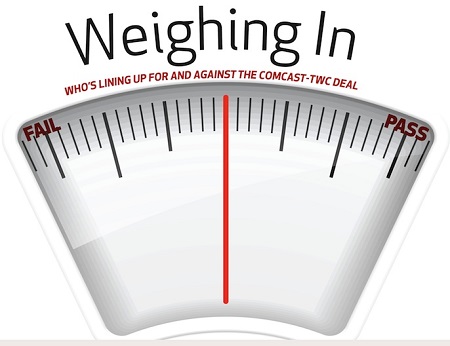Choosing Sides
The smarter way to stay on top of the multichannel video marketplace. Sign up below.
You are now subscribed
Your newsletter sign-up was successful

WASHINGTON — By Comcast’s reckoning, its deal for Time Warner Cable should pass muster in the nation’s capital.
No harm, no foul, and plenty of consumer upside. It’s a horizontal merger, the kind that would tend to have fewer problems in a straight antitrust review than a vertical combination, and Comcast already got one of those approved in its 2010 acquisition of NBCUniversal. Comcast and TWC executives point out that the deal will not reduce choice for a single subscriber, but will instead give the company the scale to deal with national competitors such as satellite- TV operators and over-the-top providers.
But a combined MSO will have 30 million subs and the yeoman’s share of ISP customers. The Federal Communications Commission has public-interest review responsibilities that go beyond a straight-up competition call. And with broadcast mergers, chairman Tom Wheeler has signaled that not being illegal is not the same thing as being in the public interest, and that not harming or reducing competition is not the same as proactively promoting it.
It’s no slam dunk, and the broadband heavy-up could be a game changer.
If the deal is ultimately approved, will there be enough conditions to ensure fair play — or, as Wall Street worries, too many that hamper profi tability?
Approving the Comcast-TWC deal would give the FCC an opportunity to renew the conditions on Comcast’s acquisition of NBCUniversal and extend them to TWC, the second-largest U.S. cable operator. (Comcast is No. 1). One big result of that would be network-neutrality conditions on an ISP serving more than one-third of all wired Internet subs, not matter the outcome of the FCC’s net neutrality do-over.
Comcast last week officially submitted the deal to the FCC, including its public interest filing of all its proposed, self-imposed conditions. There will be more proposed conditions, and more fans and foes lining up in the FCC docket as the regulator and the Justice Department undertake what is expected to about a year-long review, with some input from legislators via hearings in the House and Senate Commerce and Judiciary Committees. Once folks “show themselves” in that docket as friends or foes, that is what legally matters in terms of the opinions, and evidence, that will become part of the record for the FCC to consider.
The smarter way to stay on top of the multichannel video marketplace. Sign up below.
Above is a graphical look at some of the players already lining up on both sides, as well as those who may be working behind the scenes.
Contributing editor John Eggerton has been an editor and/or writer on media regulation, legislation and policy for over four decades, including covering the FCC, FTC, Congress, the major media trade associations, and the federal courts. In addition to Multichannel News and Broadcasting + Cable, his work has appeared in Radio World, TV Technology, TV Fax, This Week in Consumer Electronics, Variety and the Encyclopedia Britannica.

